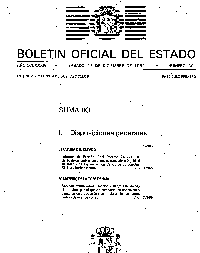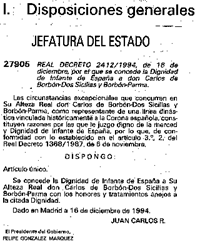The careful wording of this decree should be particularly noted. H.R.H. don Carlos is specifically described as being "de Borbón-Dos Sicilias" (Bourbon-Two Sicilies), evidence that his line has always been part of the Two Sicilies Royal Family.[3] He is also described as being "representative of a dynastic line (i.e. that of Bourbon-Two Sicilies) historically linked to the Spanish Crown". As he is unquestionably the primogeniture male descendant of this family, is described as its "representative", and is also the only person in whom these "exceptional circumstances" can coincide, this may be regarded as formal recognition by the Spanish State of his Headship of this line.
Since Spain has since 1865 recognized the unification of Italy, firstly under the Savoy Monarchy and more recently as the Italian Republic, it cannot acknowledge his corresponding dynastic rights which would limit that same recognition of Italian unity. H.R.H. don Carlos has never made any pretension to the throne of the Two Sicilies nor sought to put himself at the head of a Bourbon Monarchist movement but has limited his claims to the prerogative of awarding the Dynastic Orders of his line.
In accordance with conventional practice in decrees concerning individuals published in the Boletín Oficial del Estado only the forename, paternal and maternal names are given, along with the style of Royal Highness (or, in other cases, Excellency, as and when appropriate). None of H.R.H. don Carlos's other titles, Duke of Calabria (which appears on both his current passport and identity card), Count of Caserta, Grand Master of the Sacred Military Constantinian Order of Saint George, Grand Master of the Royal Order of Saint Januarius, Knight of the Golden Fleece, Grand Cross of Agricultural Merit, President of the Council of the Four Military Orders of Santiago, Calatrava, Alcantara and Montesa, President of the United World College Fund, etc, were included because they were not relevant.
BOLETIN OFICIAL DEL ESTADO (Click for larger image)
The exceptional nature of this honor is evidenced by the fact that H.R.H. is the first male Prince to receive the title of Infant by grant since Prince José-Eugenio of Bavaria, younger son of the second sister of King Alfonso XIII, was granted it shortly after his birth in 1909. It has otherwise been limited to the sons of the King and, by the decree of 1987 stated above, was accorded to the sisters of H.M. the King, but with no right of being utilized by their spouses. H.R.H. is the only living male to bear the title "Infant of Spain". It does not affect his position in the order of succession to the Spanish Crown which is governed by other laws..
Since the first Bourbon Prince reigned in Naples and their subsequent deposition following the unification of Italy, a number of Kings and Princes of the Two Sicilies have enjoyed the title of Infant of Spain. Most notably, they are: [4] King Charles VII of Naples and Sicily, Infant of Spain until his succession as King of Spain in 1759; King Ferdinand IV and III of Naples and Sicily (I of the Kingdom of the Two Sicilies in 1815), Infant of Spain from his birth until his death in 1825; each of the latter's younger brothers, all named in the Pragmatic Decree of 1759, were both Princes of the Two Sicilies with a right of succession and Infants of Spain; Prince Gaetano of the Two Sicilies, Count of Girgenti, a younger brother of King Francis II, was created Infant of Spain in 1868 and died childless in 1871; Prince Carlo of the Two Sicilies, created Infant of Spain in 1901, died 1949; Prince Alfonso of the Two Sicilies, created Infant of Spain 1901, succeeded as Duke of Calabria, etc, 1960, died 1964. [5]
Footnotes
[1] Bourbon-Two Sicilies being the male line and Bourbon-Parma being the line of don Carlos's mother.
[2] Article 3 reads as follows: 1. Los hijos del Rey que no tengan la condición de Príncipe o Princesa de Asturias y los hijos de este Príncipe o Princesa serán Infantes de Espana y recibirán el tratamiento de Alteza Real. Sus consortes, mientras los sean o permanezcan viudos, tendrán el tratamiento y honores qye el rey, por vía de gracia, les conceda en uso de la facultad que le atribuye el apartado f) del artículo 62 de la Constitución.2. Asimismo el Rey podrá agracir con la Dingidad de Infante y el tratamiento de Alteza o aquellas personas a las que jusgue dignas de esta merced por la concurrencia de circunstancias excepcionales.
3. Fuera de lo previsto en el presente artículo y en el anterior, y a excepción de lo previsto en el artículo 5 para los miembros de la Regencia, ninguna persona podrá:
a) Titularse Príncipe o Princesa de Asturias u ostentar cualquier otro de los titulos tradicionalmente vinculados al Sucesor de la Corona de Espana. b) Titularse Infante de Espana. c) Recibir los tratamientos y honores que corresponden a las dingidades de las precedentes letras a) y b).
[3] Those who oppose H.R.H.'s rights as Head of the Royal House of the Two Sicilies claim that the Act of Cannes of 1900 permanently removed him from membership of the Two Sicilies family and made him a member of the Spanish Royal Family, as if the two were mutually exclusive. The use of this name in this decree and other decrees concerning H.R.H. published in the Boletín Oficial del Estado indicates that this is not the view of the Spanish State.
[4] The complete list of Bourbon Infants of Spain who enjoyed a right of succession to the Two Sicilies and survived the age of three is as follows, excluding those already named above:
Issue of King Philip V
- T.H. D. Luis de Borbón y Savoia, Prince of the Asturias and later King Luis I (1707-1724);
- D. Felipe de Borbón y Savoia (1712-1719);
- D. Fernando de Borbón y Savoia, later King Fernando VI, (1713-1759);
- D. Felipe de Borbón y Farnese, later Duke of Parma (1720-1765);
- D. Luis-Antonio de Borbón y Farnese, later Cardinal Archbishop of Toledo and Sevilla and Primate of Spain, (1727-1785);
Issue of King Charles VII, III of Spain
- T.R.H. D. Filippo de Borbón y Sajonia, Duke of Calabria (1747-1777);
- D. Carlos de Borbón y Sajonia, later King Carlos IV of Spain (1748-1819);
- D. Gabriel de Borbón y Sajonia, Grand Prior of Castille and Leon of the Order of St John 1765 (1752-1788);
- D. Antonio de Borbón y Sajonia (1755-1817);
- D. Francisco Javier de Borbón y Sajonia (1757-1771);
Descendants of King Carlos IV
- T.R.H. D. Carlos de Borbón y Borbón-Parma (1780-1783);
- D. Fernando de Borbón y Borbón-Parma, later King Fernando VII of Spain (1784-1833);
- D. Carlos de Borbón y Borbón-Parma, titular Carlos V, (1788-1855);
- D. Carlos de Borbón y Braganza (1818-1861);
- D. Juan de Borbón y Braganza (1822-1887);
- D. Carlos de Borbón y Austria (1848-1909);
- D. Jaime de Borbón y Borbón-Parma (1870-1931);
- D. Alfonso Carlos de Borbón y Austria (1849-1936);
- D. Fernando de Borbón y Braganza (1824-1861);
- D. Francisco de Borbón y Borbón-Parma (1794-1865);
- D. Francisco de Asis de Borbón y Borbón-Dos Sicilias, Duke of Cadiz, King Consort (1822-1902);
- D. Alfonso de Borbón y Borbón, later King Alfonso XII, (1857-1885);
- King Alfonso XIII de Borbón y Austria (1886-1941);
- D. Alfonso de Borbón y Battenberg, Prince of the Asturias (1907-1938);
- D. Jaime de Borbón y Battenberg, Duke of Anjou and Segovia (1909-1975);
- D. Juan de Borbón y Battenberg, Count of Barcelona (1913-1993);
- D. Juan Carlos de Borbón y Borbón-Dos Sicilias, later King Juan Carlos I, b. 1938;
- D. Felipe de Borbón y Grecia, Prince of the Asturias, b. 1968;
- D. Alfonso de Borbón y Borbón-Dos Sicilias (1941-1956);
- D. Gonzalo de Borbón y Battenberg (1914-1934);
- D. Enrique de Borbón y Borbón-Dos Sicilias, Duke of Sevilla (1823-1870);
- D. Eduardo de Borbón y Borbón-Dos Sicilias (1826-1830);
- D. Fernando de Borbón y Borbón-Dos Sicilias (1826-1854);
Descendants of the Infant D. Gabriel
- T.R.H. D. Pedro Carlos de Borbón y Braganza (1786-1812); D. Sebastian de Borbón y Braganza (1811-1885);
- D. Francisco de Borbón y Borbón, Duke of Marchena (1861-1923);
- D. Pedro de Borbón y Borbón, Duke of Durcal (1862-1892);
- D. Luis de Borbón y Borbón, Duke of Ansola (1864-1889);
- D. Alfonso de Borbón y Borbón (1866-1934);
- D. Gabriel de Borbón y Borbón (1869-1889);
Descendants of the Infant Felipe, Duke of Parma
- T.R.H D. Lodovico di Borbone, later King of Etruria (1773-1803);
- Carlos Lodovico I di Borbone, King of Etruria, later Duke of Lucca and then Parma (1799-1883);
- D. Carlos III di Borbone, Duke of Parma (1823-1854);
- D. Roberto I di Borbone, Duke of Parma (1848-1907);
- D. Enrico di Borbone, Count of Bardi (1851-1905);
- D. Filippo di Borbone (1783-1786).
[5] Father of H.R.H. the Infant don Carlos, Duke of Calabria.

